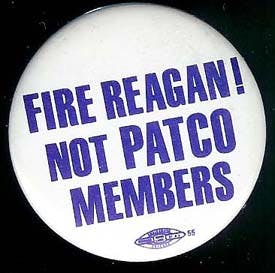It’s easy for time to get away from us, but here’s something that I remember as if it happened yesterday: President Ronald Reagan’s firing — and permanent replacement — of 13,000 air traffic controllers when they failed to heed his warning and call off an illegal strike.
Joseph McCartin, a history professor at Georgetown University, writes today in The New York Times that, “It is clear now that the fallout from the strike has hurt workers and distorted our politics in ways Reagan himself did not advocate … (and ) the long-term consequences continue to unfold in ways Reagan himself could not have predicted — producing outcomes for which he never advocated.”
Was Reagan’s decision to fire the air traffic controllers and destroy their union really the event that critically damaged the ability of organized labor to withhold their work as a means of getting management to seriously negotiate? And, does that act still reverberate in the modern workplace of 2011. All good questions, and that’s why The Strike That Busted Unions is well worth a read:
THIRTY years ago today, when he threatened to fire nearly 13,000 air traffic controllers unless they called off an illegal strike, Ronald Reagan not only transformed his presidency, but also shaped the world of the modern workplace.
More than any other labor dispute of the past three decades, Reagan’s confrontation with the Professional Air Traffic Controllers Organization, or Patco, undermined the bargaining power of American workers and their labor unions. It also polarized our politics in ways that prevent us from addressing the root of our economic troubles: the continuing stagnation of incomes despite rising corporate profits and worker productivity.”
